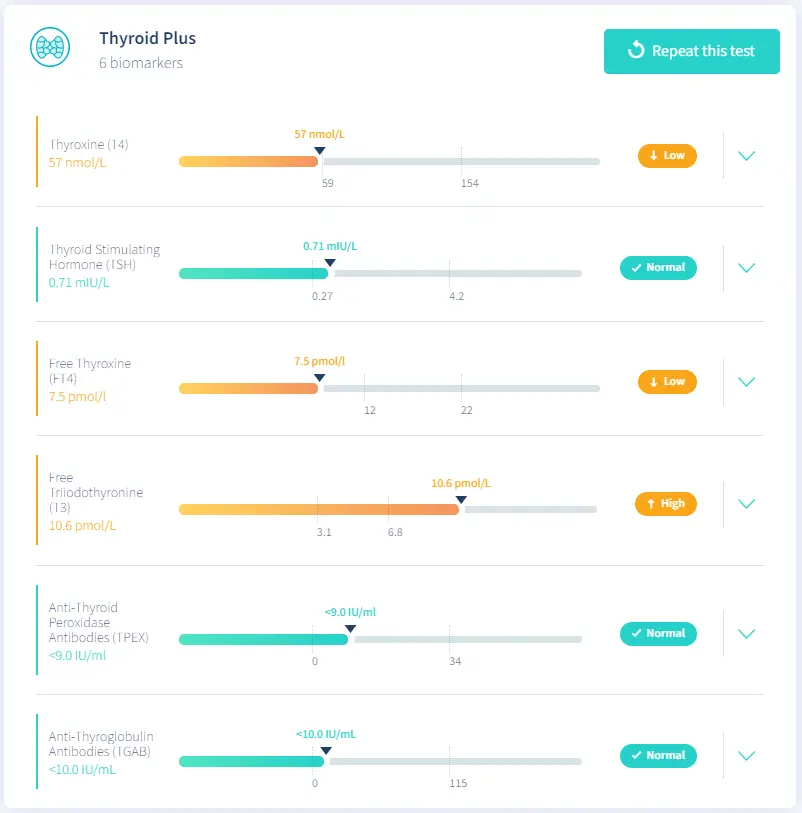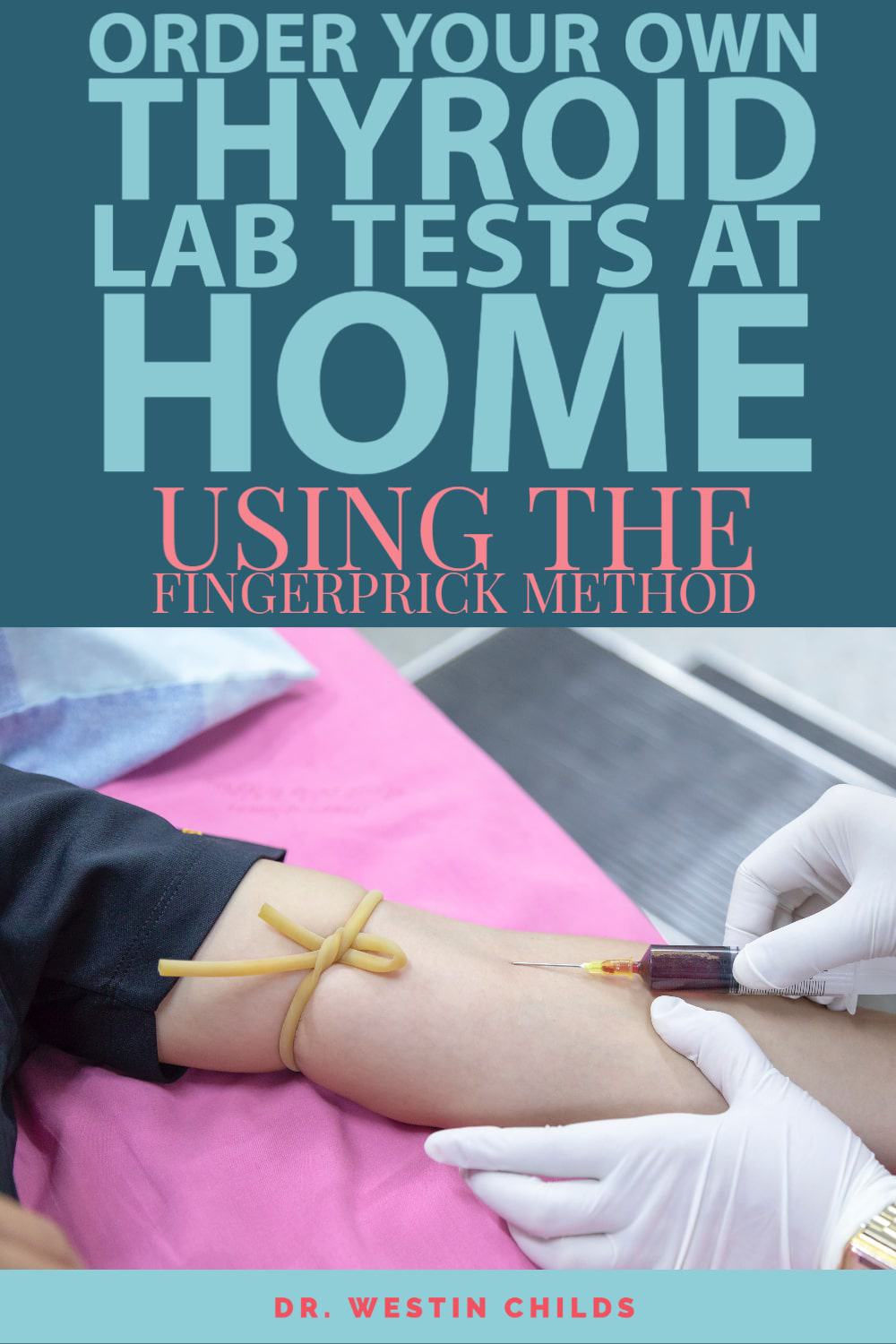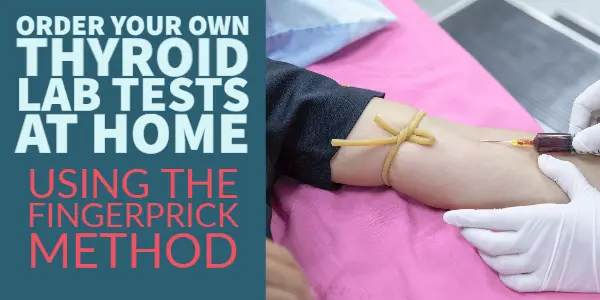Yes, you can order your own thyroid lab tests
Is it possible to actually order your own thyroid lab tests without a prescription from a doctor?
The answer is yes, but there are a few things that you should know BEFORE you do it.
There are a number of lab companies that have popped up to serve patients who are eager to learn and understand their own health and physiology.
As a thyroid patient, you can take advantage of these companies and order your OWN thyroid lab tests.
Why is this important?
Well, in a world where thyroid patients are frequently dismissed or ignored by regular physicians, it’s nice to be able to take some control into your own hands by ordering your own lab tests.
Many regular physicians, such as endocrinologists and family practice doctors, are only willing to check your TSH (thyroid stimulating hormone) and use this as a measure of your thyroid function.
As a savvy thyroid patient, you should already know that the TSH is insufficient, at least by itself, to do this job.
That’s where additional thyroid lab tests such as the free T3, free T4, reverse T3, and thyroid antibodies come into play.
Unfortunately, your doctor is unlikely to order these lab tests which leads many patients into a frustrating situation…
One where they know they need more tests but where they are unable to get them.
And this is probably the most common reason why you may want to take the route of ordering these tests yourself.
But before you do it make sure you read this article!
You’ll learn…
- Reasons you may NOT want to order your own lab tests.
- The drawbacks of using these lab companies.
- The pros and cons of at-home testing.
- And the difference between the various types of at-home tests.
DOWNLOAD FREE RESOURCES
Foods to Avoid if you Have Thyroid Problems:
I’ve found that these 10 foods cause the most problems for thyroid patients. Learn which foods you should avoid if you have thyroid disease of any type.
The Complete List of Thyroid Lab tests:
The list includes optimal ranges, normal ranges, and the complete list of tests you need to diagnose and manage thyroid disease correctly!
3 Things Before you order your own tests
Before you jump into ordering your own lab tests (we will get there in just a minute) make sure you read this section!
It will help you understand three things that you should know BEFORE you get your own thyroid labs tested so you have a complete picture of what to expect.
The first…
Getting your own thyroid lab tests drawn and ordered should always be your SECOND best option.
Your first best option is always going to be to try and work with your current physician and have them order your labs.
Doing this will not only provide you with a physician who can potentially help you with therapies and medications but it is also a lot cheaper!
These alternative lab tests are NOT covered by insurance (though you may be able to use an HSA card) which means that you will most likely have to pay out of pocket.
Because thyroid lab tests are considered to be routine they are almost always covered by insurance and usually at 100% (your mileage may vary based on your insurance company, though).
One of the reasons it took me so long to write about doing your own at-home testing is that I really want thyroid patients to try and get their own doctors to work with them and order these tests.
Having said that, I also recognize that there are some people who have exhausted all of their local options and are desperate for some help.
But if you are someone who has the option to use insurance and your current doctor I would recommend that you go that route if possible.
The second…
You should realize that there are always going to be drawbacks to ordering your own thyroid lab tests.
The companies which provide these tests, while they are probably doing their best, still come from that conventional mindset.
This means that not all of the “best” thyroid tests may be available.
There will also be variability in pricing and availability.
Some lab companies will provide all of the tests you need but at an outrageous price and others will provide only some of the tests you need but at great pricing.
Right now it seems difficult to find the perfect mix of testing and pricing.
This is another reason that I’ve been hesitant to recommend any of these companies because they just don’t provide exactly what thyroid patients need.

But I’m not sure if a company like that will ever exist so I am making a recommendation based on what is currently available.
And third…
You need to realize that you will have to do most (if not all) of the interpreting of your lab tests.
It’s one thing to feel empowered by ordering your own thyroid lab tests but it’s another to feel utterly confused by the results that you get!
Remember:
Your results are only helpful insofar as they provide you with some sort of action.
Just getting your thyroid lab tests won’t actually help you feel better.
Acting on those results in the right way will, however.
But if you order them yourself you have to remember that YOU will be the one interpreting your own results.
It’s not as hard as you think to understand what is going on with your thyroid and I have many free resources that you can use to do just that.
But I don’t want you to walk into this thinking that the hard part is over just by getting your labs drawn.
The bulk of the work comes after you get your results.
Let’s Get Checked – Get your own lab tests
PROS
- At-home testing with fingerprick blood draw (allows you to time your blood draw)
- Reasonable pricing
- Fast turnover with results being reported quickly
- Easy-to-use portal for lab analysis
CONS
- No test for reverse T3 at this time
- No test for total T3 at this time
- Not covered by insurance
There are several places where you can get your own lab tests but the one that I currently use is letsgetchecked.com.
They aren’t perfect, and no at-home lab tests are, but one of the main reasons I use them is because they are reasonably priced and you can draw your own blood at home.
The at-home blood testing is a huge bonus for me because it’s incredibly convenient and I can do it on my own schedule.
This allows you the opportunity to get your labs drawn at precisely the time you want to draw them based on when you last took your thyroid medication.
You will occasionally run into long waits or other problems at draw centers which can impact the accuracy of your thyroid lab tests.
This is true even for tests that you order from “home”.
Some of these at-home testing centers will still have you go into major draw centers (like Labcorp or Quest) to get your blood drawn.
But, there are also some downsides that I should mention to using letsgetchecked as well.
The downsides include:
- No test for reverse T3 at this time
- No test for total T3 at this time
- Not covered by insurance (no at-home testing is covered, though, so this isn’t anything new but be sure to try your HSA card if you have one)
The upsides include:
- At-home testing with a fingerprick blood draw
- Reasonable pricing ($99 for TSH, free T3, and free T4 and $119 for TSH, free T3, free T4, thyroglobulin antibodies, TPO antibodies, and total T4 levels)
- Quick turnaround with lab results
- Easy-to-use portal for managing lab results
Which Tests Should you order?
If you do decide to use letsgetchecked, what labs should you order?
If you are a thyroid pro then you probably don’t need to read this part but if you aren’t sure where to start then definitely check out this section!
#1. Starting Thyroid Panel
If you are just starting out then I recommend starting with the “Thyroid Antibody Test“.
Here is an example of my wife’s thyroid lab tests from this panel:

The reporting is clean and easy to understand with the “reference” ranges referenced as the dashed lines on the result bar.
You can see that even though many of her results are “out of range” she is functioning at 100% on pure T3 (a story for another day!).
The thyroid antibody test includes the following:
- TSH
- Free T4
- Free T3
- Thyroglobulin antibodies
- Thyroid peroxidase antibodies
- Total T4
This lab combination will help you understand thyroid function at the pituitary level (from the TSH), the availability of free thyroid hormones in your body (via free T3 and free T4), the immune status of your thyroid (whether or not you have Hashimoto’s), and whether or not your body is converting T4 into T3 in peripheral tissues.
This is a great starting point for most people and the only downside to this panel is that it does not include reverse T3 (which is not necessarily a deal breaker but it’s something that you may ultimately need).
Who should order this? Those people who fall into any of these categories:
- Those who have never had a complete thyroid lab panel before
- Those people who haven’t had a complete thyroid lab panel in over a year
- Those people who suspect they have thyroid problems but who have never been diagnosed officially
- People with Hashimoto’s, those who are post-thyroidectomy (surgical removal of the thyroid gland), and those who are post-RAI (radioactive iodine ablation).
You can order this panel here.
#2. “Efficient” Thyroid Panel
One thing to remember is that even if you start with the Starting Thyroid Panel that doesn’t mean you have to continually re-check that same panel each and every time you get your labs drawn.
For many people, ordering just your TSH, free T3, and free T4 will be a sufficient way to monitor your thyroid status.
Though, having said that, there are people who should monitor their entire function every time they check their labs (more on that below).
This efficient lab test can be ordered through the “Thyroid Test” which includes the following lab tests:
- TSH (thyroid stimulating hormone)
- Free T3
- Free T4
This efficient thyroid panel will allow you to check the status of your pituitary function (TSH), your free thyroid hormone levels and status (how well your thyroid is producing thyroid hormones), and your thyroid conversion status (whether or not you are converting T4 into T3).
Who should get this panel?
- Those people who have tested negative for thyroid antibodies the first time around.
- Those people who just want to see how they are responding to thyroid supplements, changes to their thyroid medication, or other therapies they are trying.
- Those people who are assessing their fertility status (people who want to know if their thyroid is interfering with their ability to get pregnant).
- People who are re-testing their thyroid function who don’t have a thyroid (who are post thyroidectomy) or who have had their thyroid destroyed (with radioactive iodine).
You can order this panel here.
#3. For Tracking Hashimoto’s Thyroiditis
If you are someone who has Hashimoto’s thyroiditis, the autoimmune thyroid disease, then I would recommend that you do follow and track your thyroid antibodies.
This will help you understand whether or not you are on the right track in terms of your treatment.
And, if you weren’t aware, there are many natural therapies that you can do on your own without a doctor (including the use of supplements, diet, exercise, etc.) which can help reduce thyroid antibodies and improve thyroid function.
As you utilize these therapies you can then track both your thyroid function AND your thyroid antibodies.
The best way to do this is with the “Thyroid Antibody Test” which provides information on both thyroid function AND thyroid antibody status.
You can order this panel here.
How to get accurate results
Whether you choose to use Letsgetchecked or not, there are still some rules that you should follow to ensure that you are getting the most accurate results possible.
The last thing you want to do is spend a lot of money out of pocket and then mess up your lab results because you had them drawn incorrectly!
And believe me when I say that a great many thyroid patients are doing this without even realizing it.
So this information applies to you even if you are getting your labs drawn the traditional way at a doctor’s office.
Follow these guidelines for the most accurate results:
#1. Get your labs drawn in the morning, preferably around 8:00 am.
Thyroid levels peak in the morning and then fluctuate throughout the day.
A morning sample is ideal and provides you with the highest level your thyroid will achieve that day.
#2. Make sure you are fasting.
Foods and supplements can impact your thyroid levels and you don’t want these things to alter your thyroid lab tests.
This includes coffee, by the way! Which is notorious for altering free thyroid hormone levels.
#3. Don’t take your thyroid medication right before your test.
You want to check your thyroid lab tests a full 24 hours after your last dose of thyroid medication.
So if you took your medication at 8:00 am on Tuesday morning you would get your labs drawn at 8:00 am on Wednesday morning.
Once you get your labs drawn you would then take your Wednesday dose.
#4. Stop taking biotin 2-3 days BEFORE you get your labs drawn.
Biotin is known to interfere with the thyroid lab assay and makes it look like you have more thyroid hormone in your blood.
It directly interferes with the TSH, free T3, and free T4 lab values.
Simply stop taking any supplement which has biotin in it for 2-3 days BEFORE you get your thyroid labs tested and you will be fine.
#5. Avoid contamination if using the fingerprick method.
When you handle your thyroid medication or supplements some of the residues from those medications/supplements will stay on your finger for a short period of time.
If you get blood from your finger for your thyroid lab test (this is true of those who use Letsgetchecked lab tests) there is a chance that that residue could get mixed with your blood and then seriously impact your lab results.
This isn’t usually a problem for thyroid medication because most people get their blood drawn in the forearm area and most people don’t rub their thyroid medication on the skin in that area.
But it can become a problem if you use the fingerprick method because we handle so many different substances with our hands.
Just make sure you thoroughly wash and clean your hands prior to pricking your finger for blood to ensure that this is NOT an issue!
Conclusion
There is a time and a place to check your own thyroid lab tests but, remember, I always recommend that you first try to get your lab tests from your doctor!
This will ensure that your insurance will cover your tests and prevent you from the need to pay out of pocket.
If, however, this is simply not an option or if you’ve exhausted all of your options, then you may want to consider ordering your own lab tests per the methods listed above.
I’ve included the network that I personally like but you should also be aware that there are other companies that also allow you to do the same thing.
Make sure you research them thoroughly before using them, though!
Now I want to hear from you:
Have you ever ordered your own thyroid lab tests?
If so, what made you pull the trigger to go down this route?
Are you having success with your current physician?
Are they willing to order the tests that you ask for? Why or why not?
Leave your questions or comments below!









Ulta labs (ultalabtests.com) allows you to request ALL the thyroid test that you suggest including the reverse ones. They usually have 10 or 20% discount but even full price was only $126. You request your test and then go to a local lab and you receive them 24-48 hours later.
Hi Alyce,
I’ve never heard of them but I will check it out. At first glance it looks pretty good.
I take my armour 30mg in the morning (5am) and another 15mg at noon. When is the best time to get my thyroid levels checked?
I am also thinking of taking another dose at night in the future…
Hi Amanda,
Please see this article which discusses how to get accurate thyroid lab tests: https://www.restartmed.com/thyroid-testing/